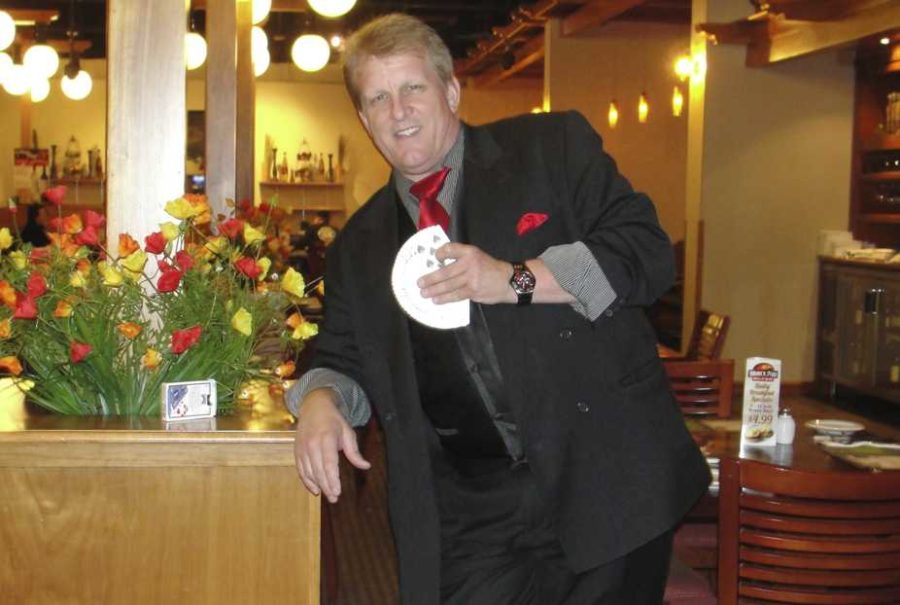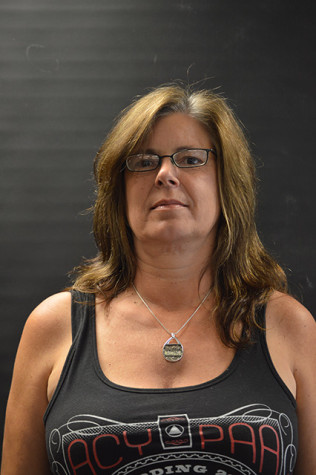A red ball lies in Frank Balzerak’s left hand. He closes his hand and asks a participant to close hers. The participant then opens her hand and there are two balls, yet nothing had actually physically exchanged hands. Or did it?
Balzerak is mysterious, calculating and quick. “Sleight-of-hand” quick. His magic blurs the line between reality and magic. “There’s magic about me, and I live in a magical world,” he said.
Balzerak, a former SRJC student, is a professionally-employed magician. He has been practicing magic since he was 12. “I remember thinking to myself, I guess I’ll learn magic, how to make things appear, disappear, change color and stuff like that,” he said. Balzerak went to the library and read everything he could in magic books. He never thought of magic as a job or career. ‘It’s just what I did. I studied it and I lived it.”
From 1984-87 Balzerak studied theater classes at SRJC. Instructor Bill Harrison saw him perform and invited him to class. He majored in media and communications, which helped in his magic career. Several years later, he was approached by an older magician who discussed starting a magic company.
“It was exciting to be offered a job in magic and have my own office. I felt successful,” Balzerak said. “I was the magic expert of our partnership, and he taught me about business and sales.”
He doesn’t want to be referred to as an “illusionist,” although he admits he creates illusions. “Illusionists are people who do magic on large stages,” Balzerak said. Sleight-of-hand is the technique that makes the magic work and is performed up close. The differences, however, are due to the different working conditions and the degrees of proximity between spectators and performer.
Sebastopol Hopmonk Tavern employee Skye Hamik said, “He is really entertaining, humorous and does cool tricks. He’s awesome!”
There are several stories about magicians using sleight-of-hand in real life. American illusionist David Copperfield said he used sleight-of-hand to fool a mugger into thinking he had nothing in his pockets while carrying a cell phone, passport and wallet. This technique has been known to deceive and cheat in gambling games. For this reason, the technique frequently carries negative connotations.
When he was 14, Balzerak was paid by The Society of American Magicians to perform at a magic convention. Approached by a large magic distributor, he released some of his original material in an instructional video called “Magic for Humans.” He also received a national award called, “The Communicator.” Several of his original routines were also featured on a DVD series called, “The World of Magic” and performed for dignitaries and celebrities such as Robin Williams.
In an interview with The Oak Leaf, Balzerak answered questions about his world of magic and intrigue.
OL: How is your approach to magic different from others and what is your perception of them?
FB: Magic is a very fragile art, like a beautiful bubble that can be popped at any time. I strive to connect and engage the audience in my magic shows. I leave wiggle room how far the audience can affect the results of the magic performed. I know I can pull back the reins at anytime.
OL: Who are some of your favorite magicians and/or mentors?
FB: When I was young, Jack McMillen, my mentor would meet with me weekly. I would practice magic tricks and he would show me how to look at them from different angles. Jack was a lifelong student of sleight-of-hand. One of Jack’s peers was Dai Vernon, who is probably the single greatest influence on magic in the 20th century. He was known as “The Godfather of all magicians,” and he lived and held court in the “Magic Castle” in Hollywood. The guiding principle of sleight-of-hand, articulated by legendary close-up magician Dai Vernon, is to “be natural.” A well-performed sleight looks like an ordinary, natural and completely innocent gesture.
OL: On your webpage, you refer to “fine magic.” What exactly does that mean?
FB: It is sophisticated, pure sleight-of-hand, which is not often seen by the public. Most people who speak of sleight-of-hand don’t really know what they are talking about. It gets lumped into all kinds of performances.
OL: Do you consider magic a career? How have you grown?
FB: I never thought of magic as a job or a career, it’s just what I did. I lived it. I studied it. Early in my career, I had sales jobs but kept doing magic and was able to earn more performing magic.
Realizing I could do what I was destined to and make a comfortable living at it, magic became my career.
All my shows have come from referrals and people who have seen my performances.
Most magicians I know spend a lot on PR and promotional materials.
OL: What are the benefits, perks and/or disadvantages of your career?
FB: The biggest downside is being unemployed between shows. I also feel that I’m only as good as my last performance. At the same time, I am amazed and blessed to be compensated so well for something I have always had a passion for. I feel like I make more doing magic than I could doing most anything else, certainly more than anything I would enjoy as much.
OL: What kind of atmosphere do you like to perform in? Where do you currently perform?
FB: I currently work in a bar/restaurant environment three nights a week. I prefer to work in the corporate world and at private events, partly for the pay and for the kind of performance I excel in. These settings also tend to have nicer showcases, including linen tablecloths, nice lighting, candles and fresh fruit to work with. I like to incorporate everyday objects in my act, and it’s nice when those everyday objects are of good quality.
OL: What do your family members think?
FB: My family members, at first, were doubtful. Thinking I was not really career-oriented, they were amazed how well magic worked out for me. My wife wrote an article for The Oak Leaf around 25 years ago, featuring a magician.
OL: What do you consider to be your style?
FB: My performance style is understated and casual.
Performing for almost 30 years, my material is second nature with minimal mistakes. I can always do some aspect of it better, clearer, or more streamlined. There’s always room for improvement. Even if I make an actual mistake, the audience is generally not aware.
Times and locations for Balzerak’s performances can be found at www.Frankbmagic.com.





